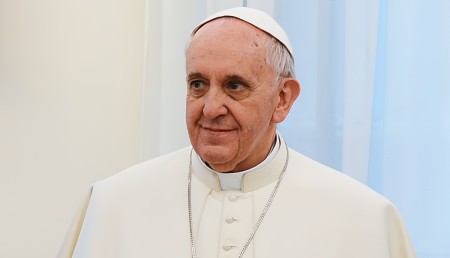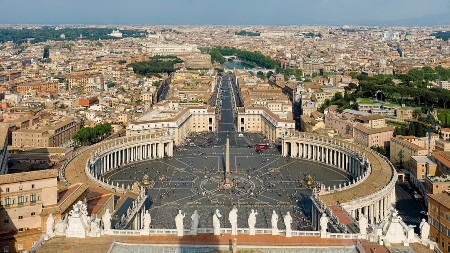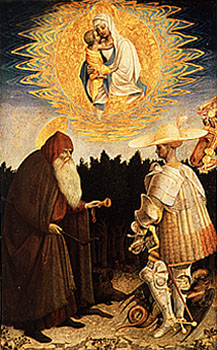St Bernadette: 'My business is to be ill'
FREE Catholic Classes
Bernadette was declared a saint 75 years ago and she still has much to teach us about living with pain.
Highlights
The Catholic Herald (UK) (www.catholicherald.co.uk/)
12/10/2008 (1 decade ago)
Published in Europe
LONDON (Catholic Herald, U.K.) - On December 8 1933, the feast of the Immaculate Conception, exactly 75 years ago this week, Pope Pius XI declared Bernadette Soubirous a saint. The choice on this date to canonise Bernadette was not coincidental since this feast represents the name that Our Lady gave herself at Lourdes when she said: "I am the Immaculate Conception."
Today the incorrupt body of St Bernadette lies in the chapel of the Convent of St Gildard at Nevers, France. The words spoken by the Blessed Virgin to her, "I do not promise you happiness in this world, but in the next", are inscribed around her shrine, and this saying was certainly fulfilled during her short earthly life, which ended at the early age of 35 in 1879.
Our Lady appeared to Bernadette 18 times at the grotto and gave her a number of messages. She told her that she wished people to come there in procession and to do penance both for themselves and for others.
Lourdes, through the spring uncovered by Bernadette, became a great centre for pilgrimages for the sick, and was also the scene of many miraculous cures; but it is also an implicit reminder through the messages of Our Lady, and through Bernadette's heroic witness, of the fact that the sufferings of Christ during his crucifixion were an essential part of God's plan for the redemption of mankind. Mgr Vernon Johnson, who was best known for his promotion of the spirituality of St Thérčse of Lisieux, had some profound insights into this connection which are well worth exploring.
While Lourdes was becoming ever more famous, Bernadette was hidden in her convent at Nevers and stricken with illness. One day some visitors asked her if she had heard of the recent wonders of Lourdes. She answered no. The visitors couldn't understand this. Bernadette's response was: "You see, my business is to be ill."
She did not become a saint because she saw Our Lady and talked with her. Bernadette became a saint through her willing acceptance of sickness and suffering.
Even from her earliest years at Nevers she had been a victim of a tubercular condition of the right knee, but this developed into an abscess in 1877, which left her in constant and agonising pain. In 1879 she became much weaker, was hardly able to eat and became quite emaciated. She was also tormented by painful sores on all her limbs. On March 28 she was anointed for the fourth and final time, dying on April 16.
Sometimes we too have to accept suffering and illness. Most of the sick who return home from Lourdes are not cured: it is also their "business" to be ill. Although we often find it hard to believe and even harder to accept, sickness and suffering are very precious, even though suffering is not something that is good in itself. However, for those with very serious illnesses, it may well be that this is the way the heavenly Father means them to enter eternal life. For some it may well be they are called to be like Bernadette and to suffer with Christ. There is no other way to heaven except through suffering, whether in this world or in purgatory.
This, of course, means suffering in the broadest sense, and also includes accepting all the inconveniences and problems of daily living. The key to all this is accepting this suffering with love, since, as St John of the Cross said in his Spiritual Canticle: "The smallest act of pure love is of greater value to the Church than all other works united together."
And in fact this is a lesson which God seems to be particularly emphasising for the Church today. This is clear if we look at some examples. Jacinta and Francisco Marto, the two youngest of the three seers of the apparitions at Fatima in Portugal in 1917, who died while still children, certainly had to suffer a great deal. Even Sister Lucia, the oldest seer, a Carmelite nun, suffered quite acutely towards the end of her very long life. Similarly, Alexandrina da Costa, who like Jacinta and Francisco was Portuguese, suffered very much. She offered herself as a victim to God to make reparation for the sins of mankind, and was declared Blessed by Pope John Paul II.
Many others have suffered greatly in modern times, including St Pio of Pietrelcina and St Maximilian Kolbe, to say nothing of all the martyrs under Communism and Nazism, but perhaps it is the life and sufferings of Pope John Paul II which have had the most impact recently.
Towards the end of his life he was only a shadow of his former self; and yet he did not allow his sufferings to cause him to swerve from his path of total dedication to Christ. Rather, he saw them as the providential way by which he would give his final testimony to the world that illness, pain, and even death have an ultimate meaning.
So these more modern saints, Blesseds, holy persons, and ordinary believers, have echoed the teaching and example of St Bernadette, and should make us realise the value of suffering.
A very beautiful prayer was offered up by St Bernadette during the last days of her long illness. As her sisters knelt round her bed they heard her saying the following prayer: "My God, it is your will. I accept the cup which you have given me. Blessed be your holy name." We could not have a more perfect prayer than this to ponder on, a prayer which echoes that of Christ in the Garden of Gethsemane: "Am I not to drink the cup that the Father has given me?" (Jn 18:11).
This text illuminates the whole problem of suffering, pain and death. It means that the pain, the suffering, the death which lie before us are simply the cup which our Heavenly Father gives us.
It is only those who are in pain who can really understand the amazing mystery that when God himself came into the world he chose pain and suffering. Between all friends there is a link which joins them in friendship, and in our friendship with Jesus this link is our willingness to suffer.
Friendship and companionship can, though, become something more: they can become union. We can not only become the special friends of Jesus through pain and suffering, but can actually become one with him so that he lives in us and we live in him (cf Gal 2:20).
Even more amazing, though, is the fact that those who suffer and are sick, by offering their sufferings in union with Christ, by offering them in union with his Cross, can call down graces and blessings upon other souls.
This is the most precious lesson which St Bernadette has left us: that suffering is not useless and that, even in the 21st century, by accepting it we can be intimately united with Christ's redeeming work.
*****
This article is based on extracts from the CTS booklet, The Message of Bernadette, originally written by Mgr Vernon Johnson, and revised and updated by Donal Anthony Foley
Join the Movement
When you sign up below, you don't just join an email list - you're joining an entire movement for Free world class Catholic education.

-

-
Mysteries of the Rosary
-
St. Faustina Kowalska
-
Litany of the Blessed Virgin Mary
-
Saint of the Day for Wednesday, Oct 4th, 2023
-
Popular Saints
-
St. Francis of Assisi
-
Bible
-
Female / Women Saints
-
7 Morning Prayers you need to get your day started with God
-
Litany of the Blessed Virgin Mary
Daily Catholic
 Daily Readings for Friday, January 17, 2025
Daily Readings for Friday, January 17, 2025 St. Anthony the Abbot: Saint of the Day for Friday, January 17, 2025
St. Anthony the Abbot: Saint of the Day for Friday, January 17, 2025 Prayer for a Blessing on the New Year: Prayer of the Day for Tuesday, December 31, 2024
Prayer for a Blessing on the New Year: Prayer of the Day for Tuesday, December 31, 2024- Daily Readings for Thursday, January 16, 2025
- St. Fursey: Saint of the Day for Thursday, January 16, 2025
- St. Theresa of the Child Jesus: Prayer of the Day for Monday, December 30, 2024
![]()
Copyright 2024 Catholic Online. All materials contained on this site, whether written, audible or visual are the exclusive property of Catholic Online and are protected under U.S. and International copyright laws, © Copyright 2024 Catholic Online. Any unauthorized use, without prior written consent of Catholic Online is strictly forbidden and prohibited.
Catholic Online is a Project of Your Catholic Voice Foundation, a Not-for-Profit Corporation. Your Catholic Voice Foundation has been granted a recognition of tax exemption under Section 501(c)(3) of the Internal Revenue Code. Federal Tax Identification Number: 81-0596847. Your gift is tax-deductible as allowed by law.







 Daily Readings for Friday, January 17, 2025
Daily Readings for Friday, January 17, 2025 St. Anthony the Abbot: Saint of the Day for Friday, January 17, 2025
St. Anthony the Abbot: Saint of the Day for Friday, January 17, 2025 Prayer for a Blessing on the New Year: Prayer of the Day for Tuesday, December 31, 2024
Prayer for a Blessing on the New Year: Prayer of the Day for Tuesday, December 31, 2024

